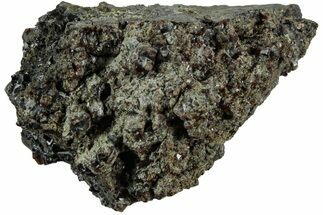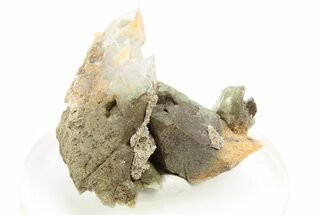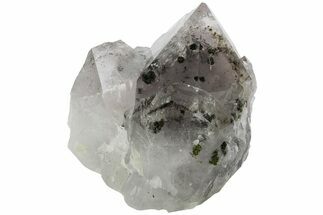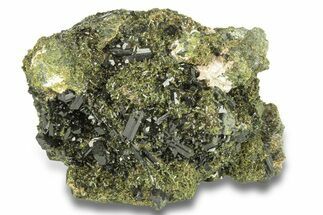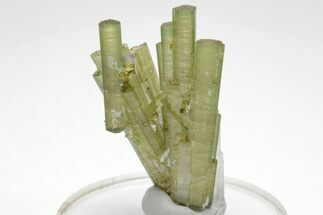This Specimen has been sold.
Ruby Red Brookite Crystal On Chlorite Quartz - Pakistan
This specimen displays chlorite included quartz crystals that formed in association with brookite crystals. The quartz crystals have green chlorite inclusions throughout most of the crystals. There are multiple brookite crystals scattered throughout the specimen, one of which is large and centered in the middle of the specimen. The base of the matrix has been cut flat, allowing for aesthetic presentation without the need for a display stand.
Brookite is one of the five forms of titanium dioxide found in nature and forms almost always in association with another mineral, frequently with quartz. This small, unique crystal is typically microscopic, but has been found with larger crystals in some locations. Some of the most beautiful and vibrant brookite specimens come out of Pakistan: it often produces crystals of a brown-orange translucent color, forming flat, computer chip-like projections out of matrix. In some rare cases, just the sim card-like crystals have been found intact, separated from a matrix on their own. These specimens are called "floaters".
About Quartz
Quartz is the name given to silicon dioxide (SiO2) and is the second most abundant mineral in the Earth's crust. Quartz crystals generally grow in silica-rich environments--usually igneous rocks or hydrothermal environments like geothermal waters--at temperatures between 100°C and 450°C, and usually under very high pressure. In either case, crystals will precipitate as temperatures cool, just as ice gradually forms when water freezes. Quartz veins are formed when open fissures are filled with hot water during the closing stages of mountain formation: these veins can be hundreds of millions of years old.
Quartz is the name given to silicon dioxide (SiO2) and is the second most abundant mineral in the Earth's crust. Quartz crystals generally grow in silica-rich environments--usually igneous rocks or hydrothermal environments like geothermal waters--at temperatures between 100°C and 450°C, and usually under very high pressure. In either case, crystals will precipitate as temperatures cool, just as ice gradually forms when water freezes. Quartz veins are formed when open fissures are filled with hot water during the closing stages of mountain formation: these veins can be hundreds of millions of years old.
SPECIES
Brookite, Chlorite & Quartz
LOCATION
Kharan, Baluchistan, Pakistan
SIZE
Entire specimen 2.4 x 1.8"
CATEGORY
ITEM
#111337
 Reviews
Reviews
